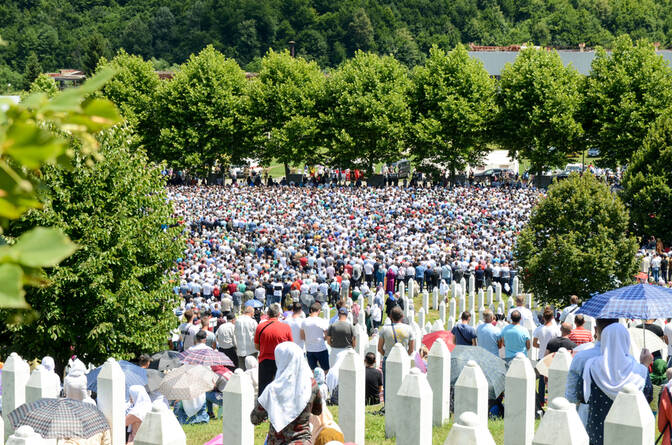Dia Internacional de Reflexão e Comemoração do Genocídio de Srebrenica de 1995
11 de Julho, sábado

Por que 11 de julho?
Neste dia, em 1995, forças sérvias da Bósnia capturaram Srebrenica, apesar do seu status de "zona segura" conforme resolução do Conselho de Segurança da ONU, e mataram mais de 8.372 homens e meninos muçulmanos. Foi o maior ato de genocídio na Europa desde o Holocausto.
Objetivo e conteúdo da resolução
Os principais objetivos do dia são:
* homenagear a memória das vítimas e expressar solidariedade com os sobreviventes; a primeira comemoração ocorreu em 11 de julho de 2024, em Nova Iorque
* condenar a negação do genocídio e a glorificação dos culpados
* convocar todos os Estados a integrar os fatos do genocídio nos seus sistemas educacionais para evitar distorções e esquecimentos
* criar o programa UNITE para o 30º aniversário do genocídio em 2025
Por que é importante
O genocídio em Srebrenica não é apenas um crime terrível, mas também um símbolo do fracasso da paz. A criação deste dia permite:
* enfrentar a negação e o revisionismo, especialmente na região dos Balcãs
* promover a educação e a memória como ferramentas para prevenir futuros genocídios
* fortalecer a responsabilidade internacional, destacando o papel dos tribunais e do direito internacional
Como o dia é comemorado?
1. Eventos oficiais nas Nações Unidas e missões especiais
2. Cerimônias memoriais e leitura dos nomes das vítimas, especialmente em Potočari
3. Conferências, exposições, palestras e mesas-redondas sobre a origem e as consequências do genocídio
4. A "Marcha pela Paz" (Marš mira) — uma caminhada anual até o memorial em memória das vítimas e sobreviventes
Significado atual
* Em julho de 2024, os restos de 14 vítimas recentemente identificadas foram reenterrados, com a participação dos filhos dos familiares sobreviventes
* A União Europeia expressou apoio ao dia e convocou os políticos da região a combater a negação do genocídio
Conclusão
O Dia Internacional de Reflexão e Comemoração do Genocídio em Srebrenica de 1995 é uma forma poderosa de memória coletiva e advertência. Estimula o reconhecimento público da tragédia, a educação e a solidariedade internacional, ajudando a prevenir a repetição de tais atrocidades no futuro.
Dia Internacional de Reflexão e Comemoração do Genocídio de Srebrenica de 1995 em outros anos
- 2021 11 de Julho, domingo
- 2022 11 de Julho, segunda-feira
- 2023 11 de Julho, terça-feira
- 2024 11 de Julho, quinta-feira
- 2025 11 de Julho, sexta-feira
- 2027 11 de Julho, domingo
